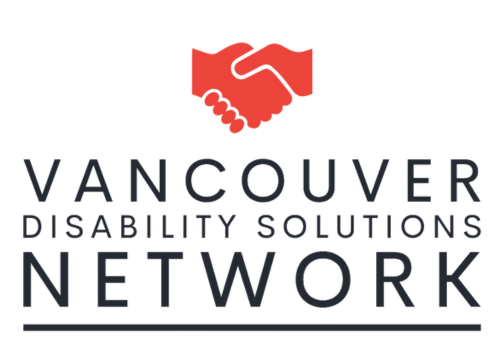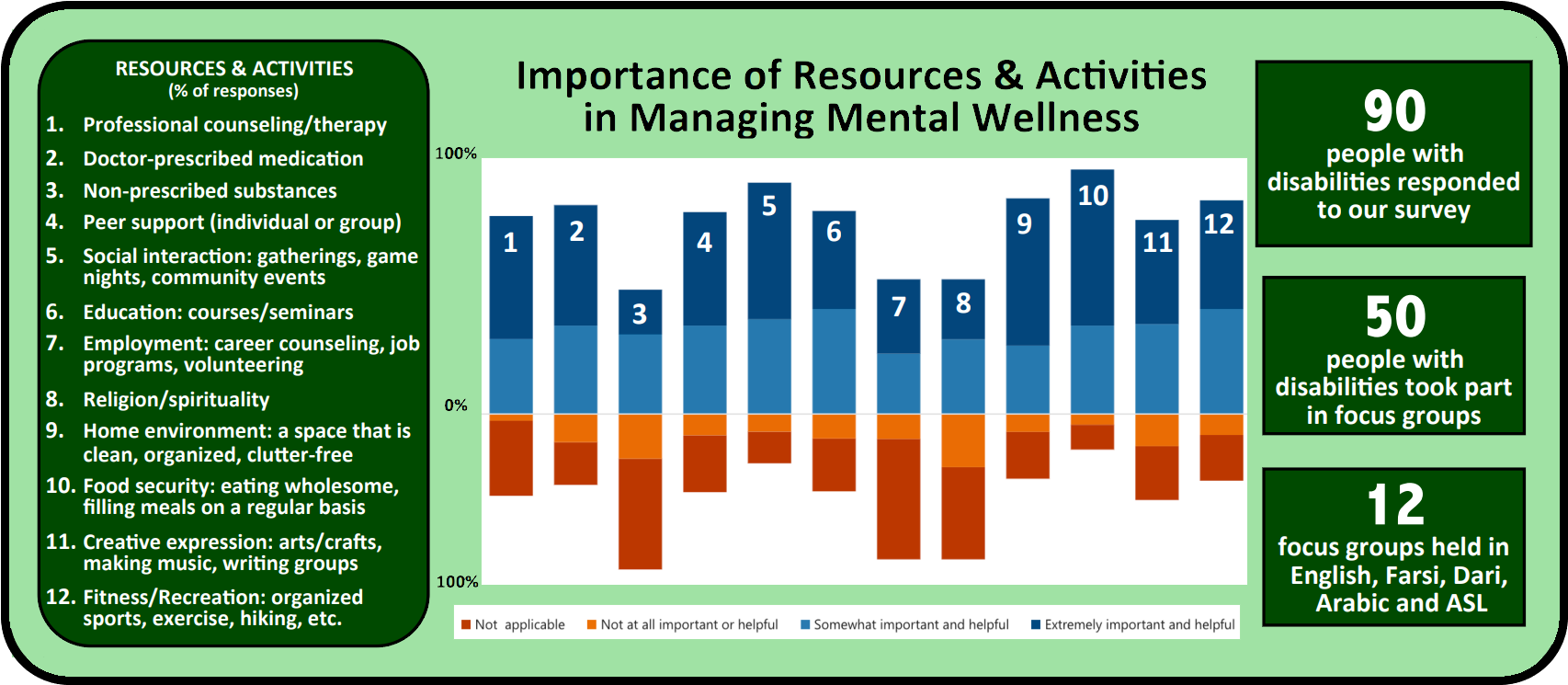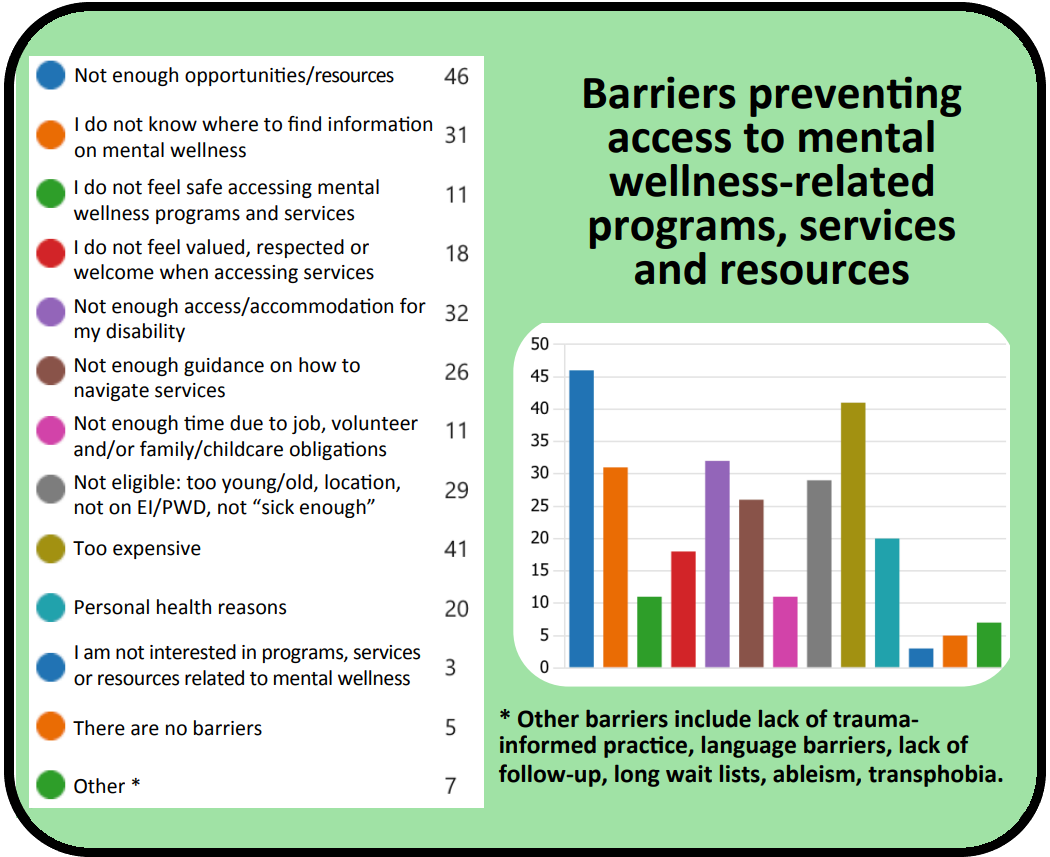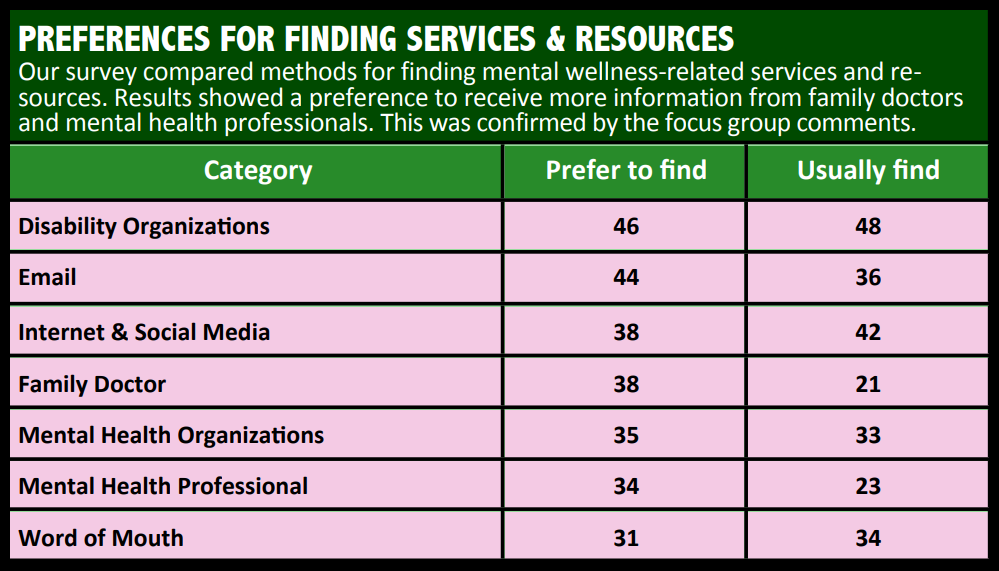
Mental Wellness for People With Disabilities
On November 28, 2023, approximately 150 participants gathered online and in person to contribute to the “Mental Wellness for People with Disabilities” (MWPD) Forum. This forum brought together disability and mental health organizations to address the following question:
“How can non-profit organizations and service providers contribute to positive mental wellness for the people with disabilities whom we serve?”
The term “mental wellness” was chosen by forum organizers to avoid medicalizing something that is universal. The goal of the forum was to emphasize self-acceptance and self-care, instead of limiting our scope to people with a medical diagnosis.
Downloadable Files
Preliminary Research
To identify the major challenges associated with mental wellness, we gathered data through an online survey, and in-depth focus group discussions. In total, we received 90 survey responses, and held 12 focus groups with an average of 5 members each. The data from our respondents were used to create informed discussion topics for the forum, and was shared with participants at the start of the event.
Improving Mental Wellness
During the forum, participants were asked to consider actionable solutions to the problems identified, with an emphasis on supplementing and improving existing mental health services. As a result, suggestions were put forth in three distinct areas: Mental Wellness Programming, Education and Training, and Communication and Navigation.

Mental Wellness Programming
Mental wellness programming refers to the set of services used to treat or improve mental wellness. Through our preliminary research, we identified the most common barriers preventing access to mental wellness programs, services, and resources.

Our findings highlight four areas where mental wellness programs can be improved or made more accessible:
- Counselling and Peer Support: Peer support programs were widely seen as an excellent, low-cost alternative to counselling.
- Diversity: Programs should reflect client diversity by being accessible to people with varying levels of disability, mobility, language, wealth, and availability.
- Reduce Stigma: In order to reduce the stigma around mental health, programs should be framed around an issue, rather than a diagnosis.
- Eligibility: Mental health services should assist ineligible clients by referring them to alternatives such as peer-support or volunteer networks.
The forum results emphasize the importance of addressing a wide diversity of needs among individuals seeking support. Moving forward, mental wellness initiatives should prioritize inclusivity by offering programs to a wider range of people. Additionally, we suggest referring clients who are found ineligible for services to alternative programs that are better suited to their needs.
Education and Training
This section explores education and training for individuals in managing their own mental wellness, and for family and friend groups on how to support their loved ones. Our findings suggest three areas of improvement for education and training:
- Fears About Suicide: Training programs should provide individuals with the tools they need to disclose suicidal thoughts, with respect to fears of being misunderstood, stigmatized, and involuntarily hospitalized.
- Discharge from Hospital: Hospitals occasionally offer specialized training to their patient’s family members, covering the physical and behavioural changes they would expect to see from a discharged patient. This kind of training could be adapted for mental health patients and their families.
- High School Level: Education and training should begin at the high school level, as people of increasingly younger ages are struggling with mental wellness.
Education and training programs provide individuals with valuable techniques for self-help, as well as the skills needed to assist others with mental wellness. These skills can be supplemented with techniques from other fields, such as hospitals, to provide specialized training about specific physical and behavioural changes. We suggest providing mental wellness education beginning as early as high school, as people of increasingly younger ages are struggling with their mental wellness.
Communication and Navigation
According to our survey, two of the greatest barriers to accessing mental wellness programs are not knowing how to find information about services, and not having enough guidance towards services. The data collected from our survey offers valuable insights into how individuals prefer to access mental wellness resources. It also highlights a gap between the preference and the availability of resources offered by family doctors and mental health professionals.

Our findings suggest four areas of improvement for enhancing individual’s capacity to navigate the system and access mental wellness programs:
- Centralized Online Resources: Create a publicly accessible online hub where all programs and services are centralized in one place.
- Improved Collaboration: Foster collaboration among organizations to enhance their ability to provide quality referrals.
- Promotional Literature: Distribute promotional literature on mental wellness and education/training programs in community centers, libraries, doctors’ offices, job fairs, etc.
- Specific Disabilities, Diseases and Conditions: Raise awareness about specific disabilities, diseases, and conditions in order to create accommodating spaces where people feel included.
Communication and navigation are vital for helping people find and access services. However, there are often gaps between the resources that service providers can offer, and what their clients require. To improve access to services, there is a need to centralize resources, and improve collaboration between organizations. Additionally, programs can increase their visibility and reach more people through effective promotional strategies. Notable strategies from our findings include raising awareness about specific disabilities, diseases, and conditions, as well as using both online and physical platforms for advertising and promotion.
Mental Wellness Full Report
The MWPD Full Report is a comprehensive document on the outcomes of the Mental Wellness for People with Disabilities Forum. It examines the identified challenges and suggestions, and presents a call to action based on the forum’s findings.